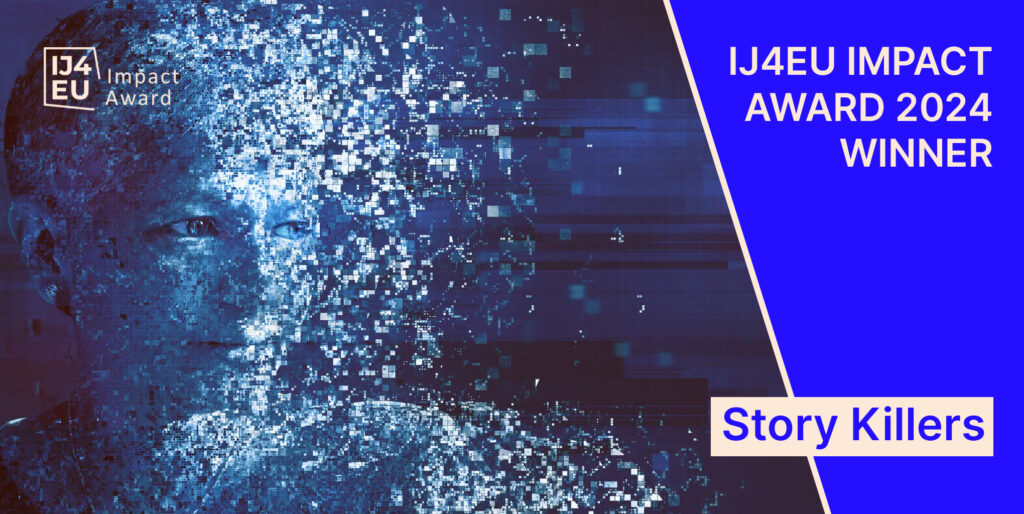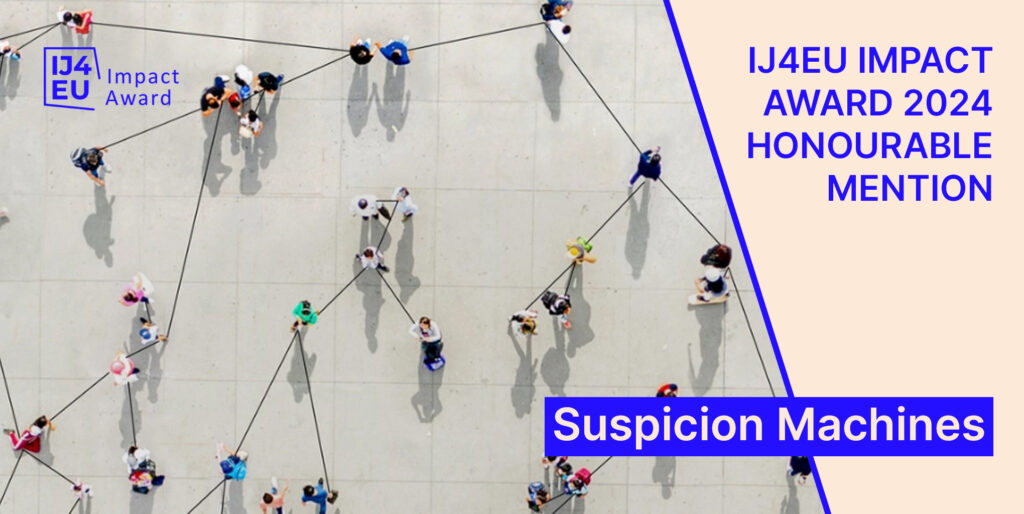Highlights from the UNCOVERED Conference 2024

What drives a journalist to undertake a complex investigation across borders? How can reporters unschooled in data science unlock the secrets of algorithms? What’s the best way to go undercover in the international porn industry?
Those questions and more took centre stage at UNCOVERED 2024, the fifth annual conference of the IJ4EU fund for cross-border investigative journalism.
Several hundred people attended the September 25-26 event in Athens, which was organised by the European Centre for Press and Media Freedom (ECPMF) in partnership with IJ4EU consortium partners the International Press Institute (IPI), the European Journalism Centre (EJC) and Arena for Journalism in Europe.
UNCOVERED 2024 was hosted by the iMEdD International Journalism Forum, a collaboration that allowed the IJ4EU community to rub shoulders with around 1,000 attendees of iMEdD’s annual event.
Get a glimpse of UNCOVERED’s key moments below.
Personal journeys
In the industrial chic of a former furniture factory, the conference kicked off with opening speeches from ECPMF, IPI and iMEdD, underlining the importance of cross-border journalistic collaboration in a time of crisis and declining press freedom.
Things then got up close and personal as Timothy Large (Austria), who heads the IJ4EU fund as director of independent media programmes at IPI, probed the motivations of “serial grantees” during a fireside chat.
Investigative journalists Ludovica Jona (Italy), Iliana Papangeli (Greece) and Gian-Paolo Accardo (Belgium), who have successfully led a string of IJ4EU-funded investigations, shared their experiences in complex cross-border collaborations.
They discussed the challenges of their work, offering insights into how their journeys have shaped their careers and views on journalism, setting an empathetic tone for the conference.

“Cross-border investigative journalism is something funders are interested in supporting,” Iliana Papangeli noted. “It is one of the best ways to ensure we continue making an impact through our reporting.”
Fresh perspectives
The next panel, Earth, Wine, and Fire: Climate Stories with a Twist, explored innovative angles in climate journalism.
Moderated by Jelena Prtoric (Germany) from Arena for Journalism in Europe, journalists Eve Tsirigotaki (France), Raluca Besliu (Belgium), Manuel Bivar (Portugal) and Cush Rodríguez Moz (Denmark) discussed stories that ranged from declining Spanish vineyards to environmental mysteries in Iberia, offering new perspectives on climate change reporting.

In a workshop titled World of Pain, paper trail media co-founder Frederik Obermaier (Germany) and Madlen Davies (Britain), senior editor at The Examination, shared insights from their joint investigation into how Mundipharma, a British multinational owned by members of the Sackler family, continues profiting from opioids. They said the issue has been largely overlooked outside the United States, stressing the need for international accountability. Read more about the investigation here.
Discussions took an even more global turn during a panel titled Beyond Europe: When Investigations Span Far-Flung Places, during which journalists shared their experiences of pursuing stories to remote corners of the world.
The panel was moderated by Zlatina Siderova (Netherlands) from EJC and featured reporters Marta Montojo (Spain), Patricia Huon (Belgium), Carol Isoux (France), Flavia Campeis (Argentina) and Ana Ćurić (Serbia), whose expertise encompasses Southeast Asia, Latin America, the Balkans and Africa’s Sahel region.

Hidden patterns
Meanwhile, Javier Luque (Austria), head of digital communications at IPI, hosted a workshop on decoding and disarming disinformation against the media.
As the day neared its end, another workshop focused on data journalism. Data Out of Documents – Finding Patterns in the Periphery was led by Carolyn Thompson (Germany) and Sotiris Sideris (Greece), both from the Center for Collaborative Investigative Journalism. They demonstrated the significance of adding a journalistic lens to data analysis, with the goal of uncovering hidden patterns and telling deeper stories when limited data is readily available.

Exposing truths from exile
The final panel of the day dove headfirst into the realities of journalism in exile, featuring ECPMF’s Elena Rodina (Germany) from Media Freedom Rapid Response as moderator.
Mohammad Bassiki (France), Fatima Karimova (Germany) and Metin Cihan (Germany) shared their experiences exposing truths behind authoritarian regimes and crises in Syria, Azerbaijan and Turkey, respectively. The discussion on the challenges and potential of journalism in exile touched on the speakers’ hands-on approaches to reporting from afar and the resilience and determination of these reporters in their pursuit of truth.

Defending press freedom
On the second day of UNCOVERED, IJ4EU joined forces with the iMEDd International Journalism Forum, with attendees from both events gathering for the first panel, Defending Press Freedom: The Case of Europe. Speakers — including Elena Rodina, ECPMF’s Media Freedom Rapid Response Coordinator, and Scott Griffen (Austria), IPI’s interim executive director — addressed the ongoing challenges to press freedom in Europe. Watch the video below.
The UNCOVERED agenda continued with Inside the Machine: Investigating AI and Algorithms, a panel moderated by IPI’s Timothy Large and featuring journalists behind three groundbreaking investigations into inscrutable AI systems.
Daniel Howden (Greece), Pablo Jiménez Arandia (Spain), Pierluigi Bizzini (Italy) and Giorgos Christides (Greece) discussed AI’s use in welfare and migration while sharing insights from their own efforts to reverse-engineering AI systems.
“We are talking about societies which have one of the highest transparency scores, and yet the transparency might totally be missing,” Howden said, commenting on the opaqueness of algorithms that make life-changing decisions for countless people in European countries.
Christides said the role of journalists was to sound the alarm on such systems, especially in contexts such as migration camps on the doorstep of the European Union, where unaccountable algorithms increasingly make decisions affecting some of the world’s most vulnerable people. “Our goal is to inspire change in any way we can,” he said.
Watch the complete conversation here.
Getting down and dirty
As the agenda drew to a close, two workshops focused on practical matters.
The first, How to Go Undercover, was moderated by ECPMF’s Deniz Bozkurt (Germany) and featured an engaging session in which journalists Nikolai Atefie (Sweden) and Elena Ledda (Spain) shared strategies for exposing illicit activities through undercover investigative work into the porn industry and people-smuggling rackets.
Nikolia Apostolou (Greece), resource centre director at the Global Investigative Journalism Network (GIJN), highlighted the intricacies of gathering evidence while ensuring personal safety. Check out GIJN’s Guide to Undercover Reporting here.
Recognising investigative work
The final workshop — What Makes an Award-Winning Investigation? — gave attendees crucial tips for creating standout applications for prestigious journalism awards.
Moderated by Gabriela Manuli (Hungary), deputy director of GIJN, the workshop featured insights from Cristian Lupșa (Romania) and Lucila Rodriguez-Alarcon (Spain) from the European Press Prize and award-winning journalist Frederik Obermaier from paper trail media.
Participants received practical guidance, such as how to articulate their stories and begin preparing entries for the European Press Prize 2025 and the IJ4EU Impact Award 2025. Lupșa urged applicants to adhere to submission guidelines, refrain from overselling and clearly communicate the purpose, scope and relevance of investigations in local contexts.
Tune into the full workshop here.
IJ4EU Impact Awards
UNCOVERED 2024 ended on a high note as the IJ4EU Impact Awards recognised three investigative teams with €5,000 each for excellence in cross-border journalism. The winners were (with no particular ranking):
The jury also gave an honourable mention to Suspicion Machines.

Read more about the award and the inspiring investigative teams that won here and view the full ceremony below.
Browse photos from the conference here. Special thanks to Tea Rissanen from IPI, and Alex Grymanis, Christos Karagiorgakis, and Ronny Skevis from iMEdD for capturing these moments.
*All countries indicated next to speakers’ names refer to countries of residence, not necessarily countries of citizenship.






